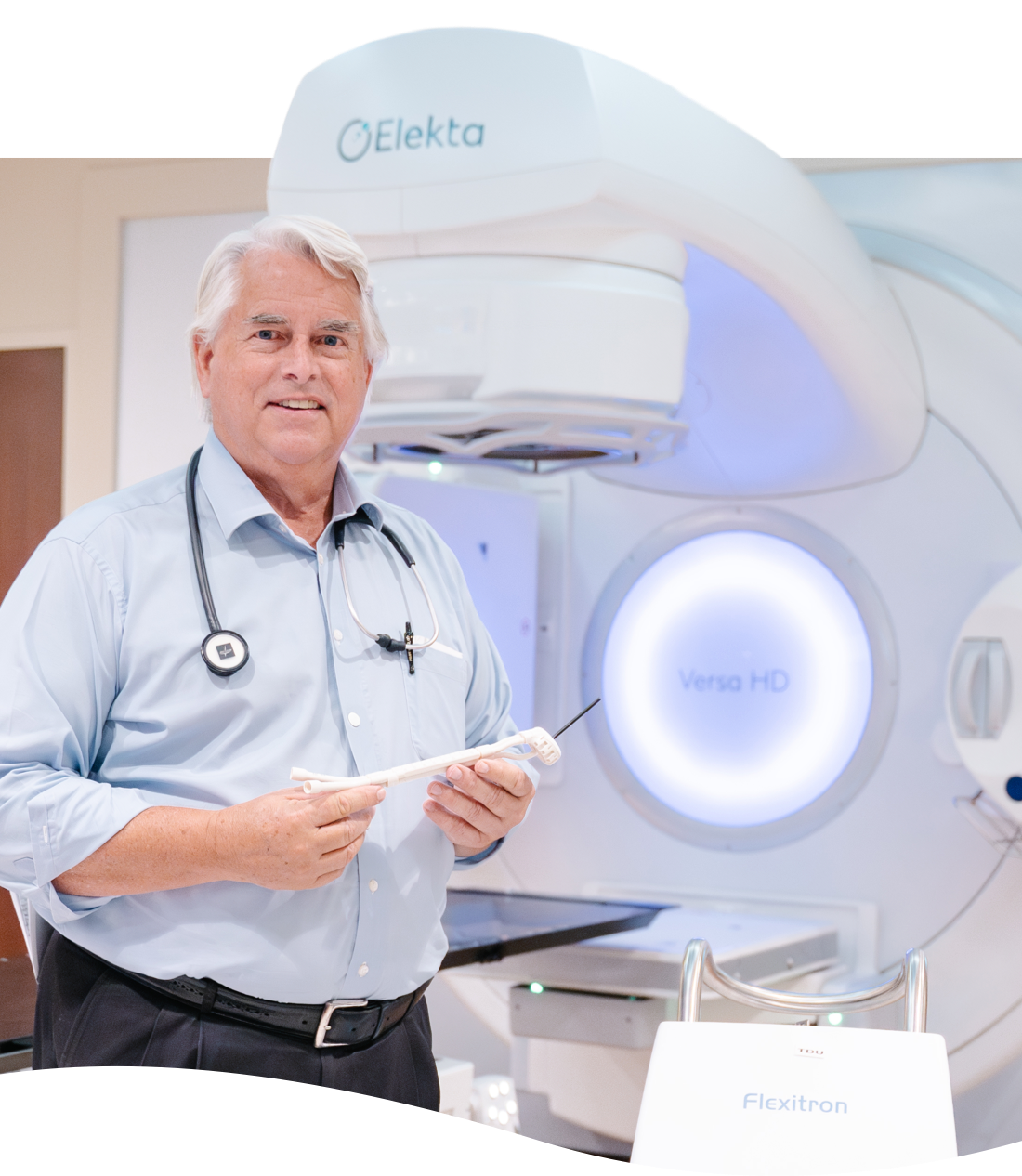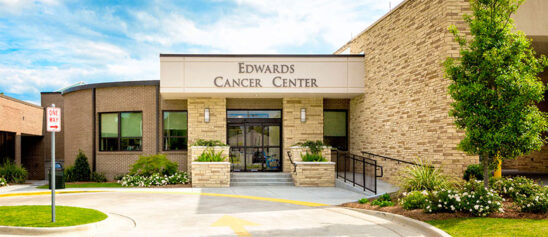
Your unique journey is our primary concern.
Cancer affects everyone differently. That’s why our care is focused solely on you. At Colquitt Regional’s Edwards Cancer Center, we provide comprehensive care in a comfortable and convenient environment, close to home and family. With access to the latest technologies and treatments, our physicians, nurses and support staff go beyond the clinical aspects of your care. Our mission is two-fold: to provide the most advanced technology and therapies available as well as an atmosphere of love, support and respect so that you and your family can focus on fighting the disease. With high-quality care and a multidisciplinary approach, we offer hope for renewed life.
At Edwards Cancer Center, you’ll find everything from screenings and prevention to early detection, advanced diagnosis and targeted therapies. With specialists in a range of cancer services – including hematology, oncology, gynecologic oncology and radiation oncology – you can stay right here in Moultrie for your care. Our support services and complementary programs promote healing and complete your comprehensive care.
Conditions and Services
Conditions
Cancer is a large group of diseases that share one characteristic: Normal cells turn cancerous, multiply and spread. Early detection and new treatments are curing cancer and helping people with cancer live longer. While not an exhaustive list, the hematology and oncology conditions below are among those we treat.
- Bladder cancer
- Blood cancers
- Leukemia
- Lymphoma (Hodgkin and Non-Hodgkin)
- Multiple myeloma
- Brain cancers
- Breast cancer
- Colorectal cancer
- Gynecological cancers
- Cervical
- Ovarian
- Uterine
- Vaginal
- Vulvar
- Kidney cancer
- Liver cancer
- Lung cancer
- Pancreatic cancer
- Prostate cancer
- Skin cancers, incl. melanoma
- Spinal cord cancers
- Thyroid cancer
- Blood disorders
- Clotting disorders
- Hemophilia
- Iron deficiency anemia
- Polycythemia Vera
- Sickle Cell Disease
- Thalassemia
- Von Willebrand Disease
Services
The medical specialty of hematology is focused on blood disorders – white blood cells, red blood cells, platelets and plasma disorders. Blood’s essential roles include delivering oxygen to organs and tissues, protecting against infections and forming clots to prevent or stop bleeding. Abnormalities can sometimes lead to cancers. Your hematology/oncology team manages diagnosis, treatment and prevention of blood disorders.
Medical oncology is focused on cancer treatment using chemotherapy, hormone therapy, immunotherapy or other targeted therapies. Your medical oncology team will coordinate your treatment plan, help you manage side effects of treatment and involve other specialists as appropriate.
Your gynecologic oncology team manages the diagnosis and treatment of cancers of the female reproductive system, as well as complex non-cancerous conditions – including pelvic masses, endometriosis, fibroids and cancers of the cervix, ovaries, uterus, vagina and vulva. Because there are no screening tests for most gyn cancers, except for cervical cancer, women must know the signs and symptoms and act on them early. While some signs may be symptoms of other ailments, it is important to seek medical care for evaluation. Our gynecologic oncologist focuses on minimally invasive management of gyn malignancies, radical pelvic surgery, robotic surgery and supportive services such as palliative and hospice medicine.
Radiation oncology uses highly focused radiation beams to destroy or minimize cancer cells. The 4D Elekta Versa HD system’s patented technology conforms to each tumor size, shape and volume, allowing physicians to target and administer higher dose rates that enhance treatment while protecting critical anatomy such as the heart, spine or bladder.
- External Beam Radiation Therapy: This local treatment targets a specific body part, such as the lung or prostate, while sparing nearby normal tissue. Radiation particles can be photons, protons or electrons.
- Stereotactic Body Radiotherapy (SBRT): Uses special equipment to position a patient and precisely deliver radiation to tumors in the body (except the brain). This therapy, administered in smaller doses over several days, helps to spare normal tissue.
- Internal Radiation Therapy: With this therapy, a radiation source is placed inside your body to emit radiation for a prescribed amount of time. The radiation source can either be solid (brachytherapy), with placement near the tumor, or liquid (systemic therapy), which is swallowed and travels through the bloodstream.
- Brachytherapy: Delivers a concentrated dose of radiation with radioactive seeds permanently or temporarily placed near or in a tumor, while sparing surrounding healthy tissue. This minimally invasive, targeted therapy offers several benefits over other options, including fewer side effects, shorter treatment duration and faster recovery. High-dose rate (HDR) brachytherapy uses a thin catheter to carry a radioactive seed to the tumor and deliver a computer-controlled radiation dose; after treatment, catheters and radioactive seeds are removed. Currently, brachytherapy is available here to treat lung cancer, and HDR brachytherapy is used for gynecological diseases such as cervical, uterine and endometrial cancers.
Chemotherapy is commonly prescribed because it has proven effective in treating many types of cancer. Powerful drugs, selected based on the type and stage of cancer and the patient’s age and overall health, are used to kill fast-growing cancer cells. Often administered by injection or IV infusion, pills/capsules or topical creams may also be used. Chemotherapy treatment carries a risk of side effects – some are mild and treatable, while others may be more serious.
Immunotherapy aims to support your body’s own immune system in fighting cancer cells. It trains your immune system to find and kill cancer cells and also helps your body produce cancer-fighting immune cells to locate and destroy cancer cells. Types of immunotherapy include checkpoint inhibitors, adoptive cell therapy (T-cell transfer therapy), monoclonal antibodies, cancer vaccines and immune system modulators.
Some types of cancer need hormones to grow, multiply and spread. Hormone therapy cuts off cancer’s access to those hormones. This type of therapy may be combined with other treatments such as surgery, chemotherapy or radiation therapy. It may also be used after treatment to lower the risk of recurrence.
Oncologists may use targeted therapy to treat cancer cells without harming healthy ones. After identifying specific genetic changes or mutations in your body that turn normal cells into cancer cells, your oncologist will select treatments (antibodies or specialized drugs) that target specific parts of the cancer cells activated by the genetic abnormalities.
Your physicians may use traditional, minimally invasive and/or robotic surgery alone or in combination with other therapies to achieve the best outcomes for you. Surgical procedures are often used to diagnose, prevent and treat cancer. Surgical biopsies enable analysis of the tissue and determination of the type and stage of cancer. If cancer has not spread, in its early stages, surgeons have a high success rate of removing or eliminating the cancer.
Colquitt Regional offers a full range of tests, technologies and procedures to identify the presence, type and extent of cancer. Diagnostic imaging, laboratory tests and biopsy procedures help your physicians create a treatment plan focused on your unique circumstances. Laboratory tests can identify abnormalities that may suggest cancer. The latest diagnostic imaging technologies available at Colquitt Regional – including 3T MRI, 128-slice CT scan, PET scan, 3D digital mammography, 3D digital bronchoscopy and help visualize tumors and assess their spread. Biopsies are often needed to confirm a diagnosis and determine the specific type of cancer.
Locations
Providers
Schedule a Consultation Today
Our oncology team is here to guide you on your cancer journey with expert care and personalized support.







